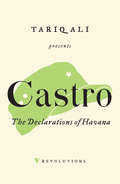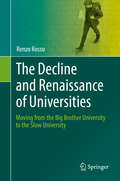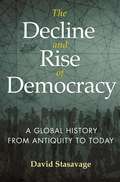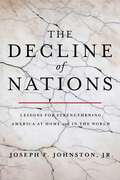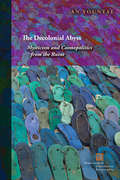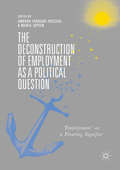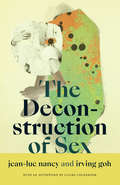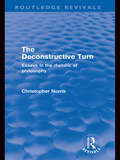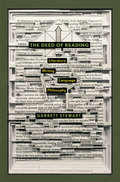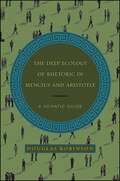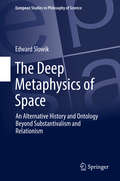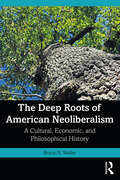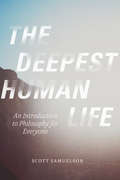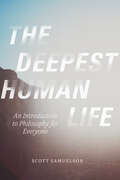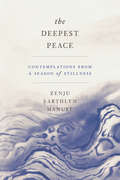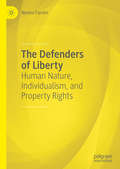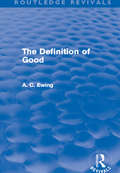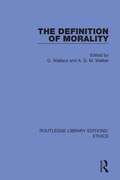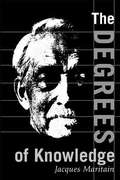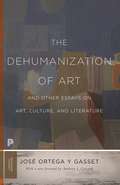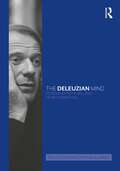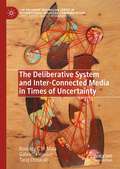- Table View
- List View
The Declarations of Havana (Revolutions Ser.)
by Tariq Ali Fidel CastroIn response to the American administration’s attempt to isolate Cuba, Fidel Castro delivered a series of speeches designed to radicalize Latin American society. As Latin America experiences more revolutions in Venezuela and Bolivia, and continues to upset America’s plans for neo-liberal imperialism, renowned radical writer and activist Tariq Ali provides a searing analysis of the relevance of Castro’s message for today.
The Decline and Renaissance of Universities: Moving from the Big Brother University to the Slow University
by Renzo RossoInstead of following the Magna Charta Universitatum, the declaration of the principles of knowledge signed in 1988 in Bologna, the academic approach pursued in Europe and the other continents over the past 30 years has strictly employed a utilitarian model of higher education. This jeopardizes academic freedom, shared governance and tenure, the three pillars of the long-established model of universities. Scientific conformism and fragmentation, educational bias and authoritarianism are the major drawbacks, together with a poor readiness to meet the emerging challenges in the labor market and technology. In this book, Renzo Rosso presents a new model for countering these developments, e.g. by establishing novel democratic rules for university governance. The Slow University paradigm positions culture and education as essential tools for the long-term survival of humankind.
The Decline and Rise of Democracy: A Global History from Antiquity to Today (The Princeton Economic History of the Western World #96)
by David StasavageA new understanding of how and why early democracy took hold, how modern democracy evolved, and what this teaches us about the futureHistorical accounts of democracy’s rise tend to focus on ancient Greece and pre-Renaissance Europe. The Decline and Rise of Democracy draws from global evidence to show that the story is much richer—democratic practices were present in many places, at many other times, from the Americas before European conquest, to ancient Mesopotamia, to precolonial Africa. Delving into the prevalence of early democracy throughout the world, David Stasavage makes the case that understanding how and where these democracies flourished—and when and why they declined—can provide crucial information not just about the history of governance, but also about the ways modern democracies work and where they could manifest in the future.Drawing from examples spanning several millennia, Stasavage first considers why states developed either democratic or autocratic styles of governance and argues that early democracy tended to develop in small places with a weak state and, counterintuitively, simple technologies. When central state institutions (such as a tax bureaucracy) were absent—as in medieval Europe—rulers needed consent from their populace to govern. When central institutions were strong—as in China or the Middle East—consent was less necessary and autocracy more likely. He then explores the transition from early to modern democracy, which first took shape in England and then the United States, illustrating that modern democracy arose as an effort to combine popular control with a strong state over a large territory. Democracy has been an experiment that has unfolded over time and across the world—and its transformation is ongoing.Amidst rising democratic anxieties, The Decline and Rise of Democracy widens the historical lens on the growth of political institutions and offers surprising lessons for all who care about governance.
The Decline of American Power: The U. S. In A Chaotic World
by Immanuel WallersteinThe internationally renowned theorist contends that the sun is setting on the American empire in this &“lucid, informed, and insightful&” account (The New York Times). The United States currently finds itself [a] superpower that lacks true power, a world leader nobody follows and few respect, and a nation drifting dangerously amidst a global chaos it cannot control. The United States in decline? Its admirers and detractors alike claim the opposite: America is now in a position of unprecedented global supremacy. But in fact, Immanuel Wallerstein argues, a more nuanced evaluation of recent history reveals that America has been fading as a global power since the end of the Vietnam War, and its response to the terrorist attacks of 9/11 looks certain to hasten that decline. In this provocative collection, the visionary originator of world-systems analysis and the most innovative social scientist of his generation turns a practiced analytical eye to the turbulent beginnings of the twenty-first century. Touching on globalization, Islam, racism, democracy, intellectuals, and the state of the left wing, Wallerstein upends conventional wisdom to produce a clear-eyed—and troubling—assessment of the crumbling international order. &“[Wallerstein&’s thought] provides a new framework for the subject of European history . . . it is compelling, a new explanation, a new classification, indeed a revolutionary one, of received knowledge and current thought.&” —Fernand Braudel
The Decline of Mercy in Public Life
by Alex Tuckness John M. ParrishThe virtue of mercy is widely admired, but is now marginalized in contemporary public life. Yet for centuries it held a secure place in western public discourse without implying a necessary contradiction with justice. Alex Tuckness and John M. Parrish ask how and why this changed. Examining Christian and non-Christian ancient traditions, along with Kantian and utilitarian strains of thought, they offer a persuasive account of how our perception of mercy has been transformed by Enlightenment conceptions of impartiality and equality that place justice and mercy in tension. Understanding the logic of this decline, they argue, will make it possible to promote and defend a more robust role for mercy in public life. Their study ranges from Homer to the late Enlightenment and from ancient tragedies to medieval theologies to contemporary philosophical texts, and will be valuable to readers in political philosophy, political theory, and the philosophy of law.
The Decline of Nations: Lessons for Strengthening America at Home and in the World
by Joseph F. Johnston Jr.In The Decline of Nations, Joseph F. Johnston delivers riveting lessons on the U.S. government viewed through the lens of excessive centralization and deterioration of the rule of law.The Decline of Nations takes an in-depth look at the condition of the contemporary United States and shows why Americans should be deeply concerned. It tackles controversial subjects such as immigration, political correctness, morality, religion and the rise of a new elite class. Author Joseph Johnston provides many historical examples of empires declining, including the Roman and British empires, detailing their trajectory from dominance to failure, and, in the case of Britain, subsequent re-emergence as modern day nation. Johnston delivers riveting lessons on the U.S. government viewed through the lens of excessive centralization and deterioration of the rule of law. He demonstrates the results of weak policies including the surging Progressive movement and the expanding Welfare state. In The Decline of Nations, Johnston asks important questions about diminished military capacity, a broken educational system, and the decline of American arts and culture. He questions the sustainability of the nation's vast global commitments and shows how those commitments are threatening America's strength and prosperity. There is no historical guarantee that the United States can sustain its economic and political dominance in the world scene. By knowing the historic patterns of the great nations and empires, there is much to be learned about America's own destiny.
The Decolonial Abyss: Mysticism and Cosmopolitics from the Ruins (Perspectives in Continental Philosophy)
by An YountaeThe Decolonial Abyss probes the ethico-political possibility harbored in Western philosophical and theological thought for addressing the collective experience of suffering, socio-political trauma, and colonial violence. In order to do so, it builds a constructive and coherent thematization of the somewhat obscurely defined and underexplored mystical figure of the abyss as it occurs in Neoplatonic mysticism, German Idealism, and Afro-Caribbean philosophy.The central question An Yountae raises is, How do we mediate the mystical abyss of theology/philosophy and the abyss of socio-political trauma engulfing the colonial subject? What would theopoetics look like in the context where poetics is the means of resistance and survival? This book seeks to answer these questions by examining the abyss as the dialectical process in which the self’s dispossession before the encounter with its own finitude is followed by the rediscovery or reconstruction of the self.
The Deconstruction of Employment as a Political Question: 'Employment' as a Floating Signifier
by Amparo Serrano-Pascual Maria JepsenThe wide-ranging European perspectives brought together in this volume aim to analyse, by means of an interdisciplinary approach, the numerous implications of a massive shift in the conception of ‘work’ and the category of ‘worker’. Changes in the production models, economic downturn and increasing digitalisation have triggered a breakdown in the terms and assumptions that previously defined and shaped the notion of employment. This has made it more difficult to discuss, and problematise, issues like vulnerability in employment in such terms as unfairness, inequality and inadequate protection. Taking the ‘deconstruction of employment’ as a central idea for theorising the phenomenon of work today, this volume explores the emergence of new semantic fields and territories for understanding and regulating employment. These new linguistic categories have implications beyond language alone: they reformulate the very concept of waged employment (including those aspects previously considered intrinsic to the meaning of work and of being ‘a worker’), along with other closely associated categories such as unemployment, self-employment, and inactivity.
The Deconstruction of Sex (a Cultural Politics book)
by Jean-Luc Nancy Irving GohIn The Deconstruction of Sex, Jean-Luc Nancy and Irving Goh discuss how a deconstructive approach to sex helps us negotiate discourses about sex and foster a better understanding of how sex complicates our everyday existence in the age of #MeToo. Throughout their conversation, Nancy and Goh engage with topics ranging from relation, penetration, and subjection to touch, erotics, and jouissance. They show how despite its entrenchment in social norms and centrality to our being-in-the-world, sex lacks a clearly defined essence. At the same time, they point to the potentiality of literature to inscribe the senses of sex. In so doing, Nancy and Goh prompt us to reconsider our relations with ourselves and others through sex in more sensitive, respectful, and humble ways without bracketing the troubling aspects of sex.
The Deconstructive Turn: Essays in the Rhetoric of Philosophy (Routledge Revivals)
by Christopher NorrisWhat might be the outcome for philosophy if its texts were subjected to the powerful techniques of rhetorical close-reading developed by current deconstructionist literary critics? When first published in 1983, Christopher Norris’ book was the first to explore such questions in the context of modern analytic and linguistic philosophy, opening up a new and challenging dimension of inter-disciplinary study and creating a fresh and productive dialogue between philosophy and literary theory.
The Deed of Reading: Literature * Writing * Language * Philosophy
by Garrett StewartGarrett Stewart begins The Deed of Reading with a memory of his first hesitant confrontation, as a teenager, with poetic density. In that early verbal challenge he finds one driving force of literature: to make language young again in its surprise, coming alive in each new event of reading. But what exactly happens in the textual encounter to make literary phrasing resonate so deeply with readers?To take the measure of literary writing, The Deed of Reading convenes diverse philosophic commentary on the linguistics of literature, with stress on the complementary work of Stanley Cavell and Giorgio Agamben. Sympathetic to recent ventures in form-attentive analysis but resisting an emphasis on so-called surface reading, Stewart explores not some new formalism but the internal pressures of language in formation, registering the verbal infrastructure of literary prose as well as verse. In this mode of "contextual" reading, the context is language itself. Literary phrasing, tapping the speech act's own generative pulse, emerges as a latent philosophy of language in its own right, whereby human subjects, finding no secure place to situate themselves within language, settle for its taking place in, through, and between them.Stewart watches and hears this dynamics of wording played out in dozens of poems and novels over two centuries of English literary production--from Wordsworth and Shelley to Browning and Hopkins, from Poe and Dickens through George Eliot, Conrad, James, and on to Toni Morrison. The Deed of Reading offers a revisionary contribution to the ethic of verbal attention in the grip of "deep reading."
The Deep Ecology of Rhetoric in Mencius and Aristotle: A Somatic Guide (SUNY series in Chinese Philosophy and Culture)
by Douglas RobinsonMencius (385–303/302 BCE) and Aristotle (384–322 BCE) were contemporaries, but are often understood to represent opposite ends of the philosophical spectrum. Mencius is associated with the ecological, emergent, flowing, and connected; Artistotle with the rational, static, abstract, and binary. Douglas Robinson argues that in their conceptions of rhetoric, at least, Mencius and Aristotle are much more similar than different: both are powerfully socio-ecological, espousing and exploring collectivist thinking about the circulation of energy and social value through groups. The agent performing the actions of pistis, "persuading-and-being-persuaded," in Aristotle and zhi, "governing-and-being-governed," in Mencius is, Robinson demonstrates, not so much the rhetor as an individual as it is the whole group. Robinson tracks this collectivistic thinking through a series of comparative considerations using a theory that draws impetus from Arne Naess's "ecosophical" deep ecology and from work on rhetoric powered by affective ecologies, but with details of the theory drawn equally from Mencius and Aristotle.
The Deep Metaphysics of Space
by Edward SlowikThis volume explores the inadequacies of the two standard conceptions of space or spacetime, substantivalism and relationism, and in the process, proposes a new historical interpretation of these physical theories. This book also examines and develops alternative ontological conceptions of space, and explores additional historical elements of seventeenth century theories and other metaphysical themes. The author first discusses the two main opposing theories of the ontology of space. One, known as substantivalism, proposes space to be an entity that can exist independently of material things. The other, relationism, contends that space is a relation among material things. Readers will learn about specific problems with this dichotomy. First, Newton and Leibniz are often upheld as the retrospective forerunners of substantivalism and relationism. But, their work often contradicts the central tenets of these views. Second, these theories have proven problematic when transferred to a modern setting, especially with regards to general relativity and the recent quantum gravity hypotheses. The author details an alternative set of concepts that address these problems. The author also develops a new classificational system that provides a more accurate taxonomy for the elements of all spatial ontologies. This classification obtains successful analogies between Newton, Leibniz, and other natural philosophers with contemporary physical theories.
The Deep Roots of American Neoliberalism: A Cultural, Economic, and Philosophical History
by Bruce N. WallerFocusing on why neoliberalism gained such a unique strong hold in the United States, philosopher Bruce N. Waller in this book traces the source back to the country’s origins and the entwined core values of the nation’s Founding Fathers. Their extreme commitment to private property rights (as evinced in a unanimous vote for the Constitution’s Fugitive Slave Clause), an aversion to widespread democracy, and a deep belief in the uniquely just nature of their new country together created the ideal conditions for neoliberalism’s growth and success. Waller also provides a clear analysis of the moral and psychological conditions so hospitable to neoliberalism, including the compatibility of a faith in the "invisible hand" of the free market with the widespread belief – which remains prevalent in the United States – that the world is just and people generally get what they deserve. Waller examines how the ideal of moral responsibility in the United States provides the core belief that holds in place the basic principles of American neoliberalism. The book ends by shedding light on the deleterious effects of neoliberalism and shows that its replacement requires not only the amelioration of enormous inequity in wealth, but also the opportunity for all citizens to exercise autonomy, control, and critical thought in their lives and workplaces. Key Features Traces neoliberal values deep into American history and culture Uses empirical psychological research to explain the broad appeal of neoliberalism Describes the strong interconnected neoliberal value system of belief in a just world, personal responsibility, and radical individualism, and their combined influence on American culture Examines the influence of neoliberal values on the American criminal justice and educational systems
The Deepest Human Life: An Introduction to Philosophy for Everyone
by Scott SamuelsonWinner of the 2015 Hiett Prize in the Humanities. Sometimes it seems like you need a PhD just to open a book of philosophy. We leave philosophical matters to the philosophers in the same way that we leave science to scientists. Scott Samuelson thinks this is tragic, for our lives as well as for philosophy. In The Deepest Human Life he takes philosophy back from the specialists and restores it to its proper place at the center of our humanity, rediscovering it as our most profound effort toward understanding, as a way of life that anyone can live. Exploring the works of some of history's most important thinkers in the context of the everyday struggles of his students, he guides us through the most vexing quandaries of our existence--and shows just how enriching the examined life can be. Samuelson begins at the beginning: with Socrates, working his most famous assertion--that wisdom is knowing that one knows nothing--into a method, a way of approaching our greatest mysteries. From there he springboards into a rich history of philosophy and the ways its journey is encoded in our own quests for meaning. He ruminates on Epicurus against the sonic backdrop of crickets and restaurant goers in Iowa City. He follows the Stoics into the cell where James Stockdale spent seven years as a prisoner of war. He spins with al-Ghazali first in doubt, then in the ecstasy of the divine. And he gets the philosophy education of his life when one of his students, who authorized a risky surgery for her son that inadvertently led to his death, asks with tears in her eyes if Kant was right, if it really is the motive that matters and not the consequences. Through heartbreaking stories, humanizing biographies, accessible theory, and evocative interludes like "On Wine and Bicycles" or "On Zombies and Superheroes ," he invests philosophy with the personal and vice versa. The result is a book that is at once a primer and a reassurance--that the most important questions endure, coming to life in each of us.
The Deepest Human Life: An Introduction to Philosophy for Everyone
by Scott SamuelsonThis accessible and thought-provoking introduction to philosophy shows how the eternal questions can shed light on our lives and struggles.These days, we generally leave philosophical matters to professional philosophers. Scott Samuelson thinks this is tragic, for our lives as well as for philosophy. In The Deepest Human Life, he restores philosophy to its proper place at the center of our humanity, rediscovering it as our most profound effort toward understanding, as a way of life that anyone can live. Exploring the works of some of history’s most important thinkers in the context of the everyday struggles of his students, Samuelson guides readers through the most vexing quandaries of existence—and shows just how enriching the examined life can be. Samuelson begins at the beginning: with Socrates, and the method he developed for approaching our greatest mysteries. From there he embarks on a journey through the history of philosophy, demonstrating how it is encoded in our own personal quests for meaning. Through heartbreaking stories, humanizing biographies, accessible theory, and evocative interludes like “On Wine and Bicycles” or “On Zombies and Superheroes,” Samuelson invests philosophy with the personal and vice versa. The result is a book that is at once a primer and a reassurance—that the most important questions endure, coming to life in each of us. Winner of the 2015 Hiett Prize in the Humanities
The Deepest Peace: Contemplations from a Season of Stillness
by Zenju Earthlyn ManuelA beautiful glimpse into the daily practice of a modern contemplative, The Deepest Peace reveals moments of stunning clarity from the eyes of a Zen priest. Through silence, stillness, and practice, Zenju Earthlyn Manuel transmits how it is possible to cultivate and experience peace.While there is suffering in the world and in each of us, there is also the possibility and the experience of peace. As Zenju Earthlyn Manuel, a Zen priest who has written at length on race, gender, sexual orientation, and homelessness, writes in the introduction: "I have testified many times of my suffering. Before I die, I must speak of peace." The Deepest Peace is a poetic, lyrical ode to the ways contemplative practice illuminates daily life. It is at once a window into Zenju's personal practice, and an invitation to begin our own.
The Defenders of Liberty: Human Nature, Individualism, and Property Rights
by Neema ParviniThe Defenders of Liberty presents a history of economic liberalism from the Renaissance to the present. It chronicles the tradition of thought that sees human nature as social yet self-interested, methodological individualism as its key analytical tool, and property rights as foundational to a civilised society. In the development of this way of thinking, it considers the contributions of many key thinkers including Niccolò Machiavelli, Thomas Hobbes, John Locke, Richard Cantillon, A.J.R. Turgot, David Hume, Adam Smith, Nassau William Senior, Richard Cobden, Herbert Spencer, Jean-Baptiste Say, Carl Menger, William Stanley Jevons, Gaetano Mosca, Eugen Böhm-Bawerk, Vilfredo Pareto, Phillip Wicksteed, Edwin Cannan, Ludwig von Mises, Lionel Robbins, F.A. Hayek, W.H. Hutt, Milton Friedman, George Stigler, Murray N. Rothbard, James M. Buchanan, and Thomas Sowell. The book contends that liberalism needs to be grounded in realism, and that it has been derailed whenever economists have deviated from an explicitly realist understanding of human nature, individualism and property rights. It argues that the cause of liberalism was compromised by errors in economic reasoning by such major figures as David Ricardo, John Stuart Mill, Alfred Marshall, A.C. Pigou, and John Maynard Keynes. In diagnosing what has gone wrong for liberalism in the twenty-first century, The Defenders of Liberty argues against substituting mathematical abstraction for causal realism; it opposes interventionist central banking; it seeks to recover economic liberalism from social and political liberalism, which are somewhat unrelated schools of thought; it resists a view of human nature rooted in selfishness or atomised individualism; and finally alerts defenders of freedom to the ruthless but effective language games played by their opponents. This book will be of interest to the educated general reader as well as undergraduates and postgraduates in disciplines such as economics, political theory and philosophy.
The Definition of Good (Routledge Revivals)
by Alfred C EwingFirst published in Great Britain in 1948, this book examines the definition of goodness as being distinct from the question of What things are good? Although less immediately and obviously practical, Dr. Ewing argues that the former question is more fundamental since it raises the issue of whether ethics is explicable wholly in terms of something else, for example, human psychology. Ewing states in his preface that the definition of goodness needs to be confirmed before one decides on the place value is to occupy in our conception of reality or on the ultimate characteristics which make one action right and another wrong. This book discusses these issues.
The Definition of Morality
by G. Wallace A. D. M. WalkerOriginally published in 1970, the papers in this volume discuss the essential and defining characteristics of morality and moral issues and examine how moral views differ from political views, moral beliefs from religious beliefs, and moral judgements from aesthetic judgements. Some of the chapters discuss problems of method and shed light on the complex conditions which any successful definition of morality must satisfy. Taken collectively, these papers reflect he wide variety of approaches adopted by contemporary philosophers.
The Degradation of Ethics Through the Holocaust
by Paul E. WilsonThis book discusses ethical behavior through the genocidal stages of the Holocaust. Paul E. Wilson first looks at the antisemitism in Germany and Europe beginning in the decades preceding the Nazis reign of terror, and goes on to discuss the ethical decisions made in the initial stages that moved society toward genocide. The author maintains that the stages of genocide represent subtle changes that can be happening within a society in response to the moral choices made by actors. By giving attention to the stages of genocide in the Holocaust, this book contributes to the overall understanding of how the Holocaust was possible, and encourages the moral community to join the watch for the development of genocide in the modern world.
The Degrees Of Knowledge (Collected Works of Jacques Maritain Volume #7)
by Ralph Mcinerny Jacques Maritain Gerald B. PhelanThis work is Maritain's masterpiece. Published as Distinguer pour unir, ou Les degres du savoir in 1932, the book proposes a hierarchy of forms of knowledge that culminates in mystical experience and that wisdom which is a gift of the Holy Ghost. His inspiration is St Thomas Aquinas.
The Dehumanization of Art and Other Essays on Art, Culture, and Literature
by José Ortega y GassetA classic work on radical aesthetics by one of the great philosophers of the early twentieth century No work of philosopher and essayist José Ortega y Gasset has been more frequently cited, admired, or criticized than his response to modernism, “The Dehumanization of Art.” The essay, originally published in Spanish in 1925, grappled with the newness of nonrepresentational art and sought to make it more understandable to the public. Many embraced the essay as a manifesto extolling the virtues of vanguard artists and promoting efforts to abandon the realism and the romanticism of the nineteenth century. Others took it as a denunciation of everything that was radical about the avant-garde. This Princeton Classics edition makes this essential work, along with four of Ortega’s other critical essays, available in English. A new foreword by Anthony J. Cascardi considers how Ortega’s philosophy remains relevant and significant in the twenty-first century.
The Deleuzian Mind (Routledge Philosophical Minds)
by Henry Somers-Hall Jeffrey A. BellGilles Deleuze was one of the most influential philosophers of the second half of the twentieth century. As with other French philosophers of his generation, such as Jacques Derrida and Michel Foucault, Deleuze’s work and his collaboration with Félix Guattari has also had huge influence in other disciplines, particularly literature, film studies, architecture, and science and mathematics.The Deleuzian Mind is an outstanding collection that explores the full extent and significance of Deleuze's work, its reception and its legacy. Comprising 38 chapters written by an international and interdisciplinary team of contributors, the volume is divided into eight clear parts: Situating Deleuze A New History of Philosophy. Deleuze’s Precursors Encounters Critical and Clinical The Early Philosophy. A Logic of Sense The Later Philosophy. The Wasp and the Orchid Art and Literature Deleuze, Maths and Science Deleuze and Politics. With its wide-ranging exploration of Deleuze’s thought and the huge influence it continues to have within the theoretical humanities and social sciences, The Deleuzian Mind is invaluable reading for students, researchers and scholars in philosophy, literature, film studies and political theory.
The Deliberative System and Inter-Connected Media in Times of Uncertainty (The Palgrave Macmillan Series in International Political Communication)
by Rousiley C. Maia Gabriella Hauber Tariq ChoucairAdopting a systemic perspective, this book explores media-based communication and reason-giving as a linkage process that transcends time and space. Arguments, reasoning perspectives and emotional concerns link elites’ and citizens’ political judgement within and across a set of interrelated arenas in the political system.
